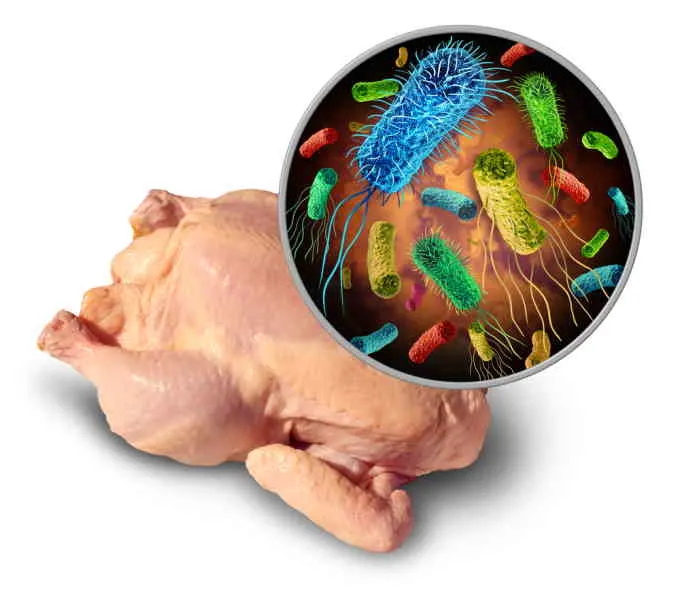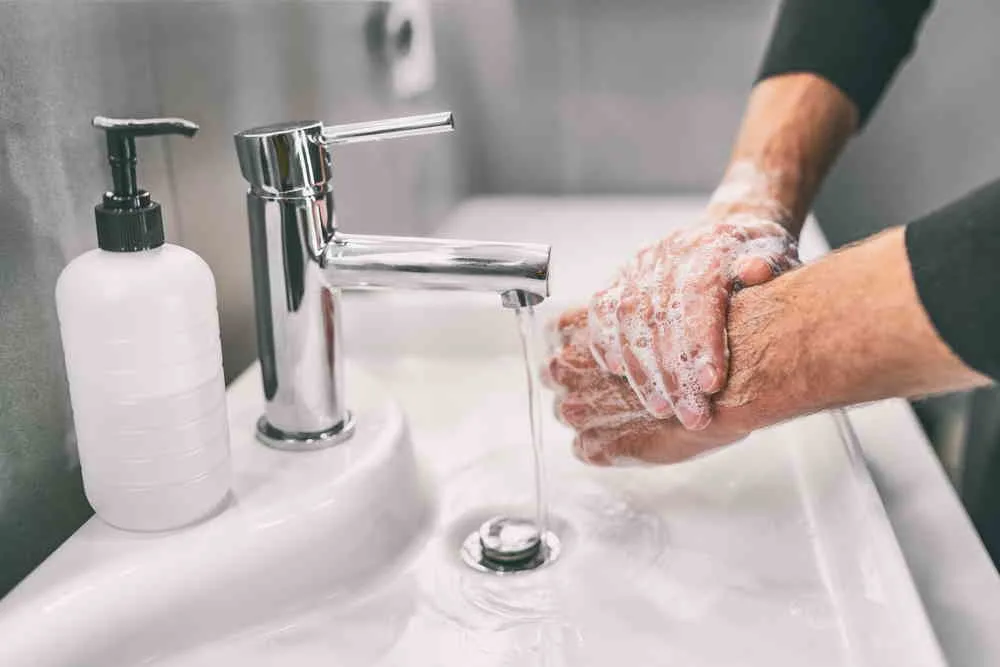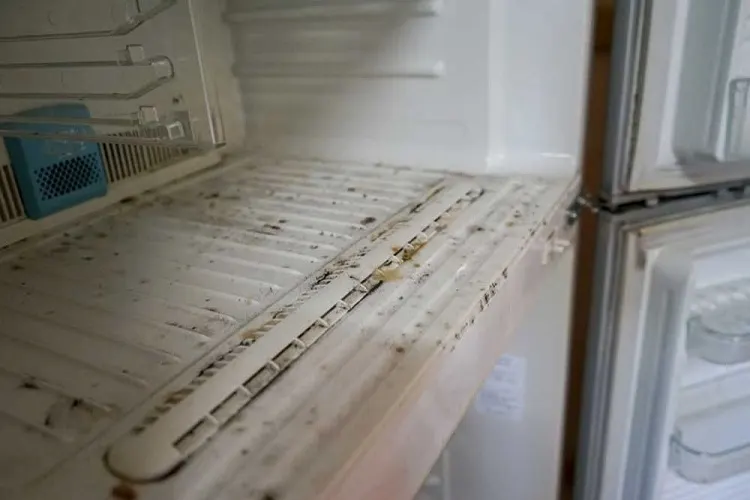SHTFDad may collect a share of sales or other compensation from the links on this page.
Making sure that you avoid bacterial contamination is always important. In everyday life, we are constantly coming into contact with different foods, as well as many different surfaces and people.
It is important to make sure everything is hygienic, and that things like food are protected from possible bacteria so that we don’t become sick or ill.
However, during an emergency, avoiding bacterial contamination becomes even more important. Mainly because you are likely to have fewer resources if something does go wrong and you become sick, but also because there will be limited food, and you don’t want to have it go to waste due to it becoming contaminated!
But what exactly is bacterial contamination?
And more importantly, how can we avoid it? We can tell you everything you need to know, and we will include the 6 best ways of avoiding bacterial contamination. So let’s get right into it!
What is bacterial contamination?
Let’s start by clarifying exactly what bacterial contamination is, and why it needs to be avoided.
Bacterial contamination, put simply, is the contamination of food via bacteria. So essentially, bacteria multiply within the food, causing it to go bad, and if you consume this food, it will make you sick. For example, food poisoning is due to bacterial contamination.
The reason for avoiding such a thing is pretty obvious, you don’t want to get ill or sick from eating food! In fact, if the bacterial contamination is severe, you could become hospitalized, and in some cases, die. So it is absolutely vital that specific health guidelines are followed to avoid bacterial contamination as much as possible.
Most establishments and services that offer food to the general public are actually made, by law, to abide by a big number of health and safety guidelines that are designed to reduce the risk of bacterial contamination in food. But in your everyday life, it is also up to you to take the right steps, in order to lower the chances of you contaminating your food, and becoming ill from it.
It is worth mentioning that bacterial contamination will not always make you sick. The bacterial contamination merely causes a bacterial infection in your body, and then it depends on a few different things whether you barely notice, you get sick, or you end up hospitalized and in danger of dying.
Some of the factors that this depends on, are as follows:
- Your immune system, and how effective it is at fighting off the bacterial infection.
- Your everyday diet. This is because some vitamins and minerals are vital in keeping your immunity system working and in good condition, so not having enough of them will make you more
- vulnerable to illness and infection. This is why it is important to have a healthy balanced diet!
- The amount of contaminated food that you consumed. If it was just a bite, it shouldn’t affect you that much. But if you had an entire meal that was contaminated with bacteria, you’re in trouble.
- The type of bacteria that has contaminated the food. There are all sorts of bacteria, some more severe than others!
6 Ways to Avoid Bacterial Contamination

In order to keep yourself safe from possible food poisoning, it is very important that you actively take measures to reduce and avoid bacterial contamination.
1. Be careful around raw food
Raw food contains a whole load of different bacteria, and some of them can be bad and therefore cause food poisoning. There’s a reason why we cook our food, after all! Our bodies just aren’t able to process the number of bacteria in raw food.
This is why you have to be incredibly careful around raw food, and the way you handle it.
Make sure to store your raw food separately from the rest of the food, and if possible, place raw food into a different shopping bag from the rest.
When opening and preparing raw food, make sure to wash your hands and the surfaces, so that no other food comes into contact with the liquids of the raw food!
2. Wash your hands

Washing your hands is incredibly important for a huge number of different reasons, but it is also vital in order to reduce the risk of bacterial contamination.
The truth is, our hands touch all sorts of things and surfaces throughout the day, which in turn have been touched by other people that have been touching all sorts of things.
And bacteria are everywhere, seriously. The amount of dirt and bacteria on your hands is enough to make anyone scream in disbelief. So always wash your hands.
But especially when you are preparing food, it is essential that you wash your hands beforehand, to avoid any bacteria you might be carrying to transfer onto the food that you are then going to consume.
It’s even more important if you’re dealing with raw food! Make sure there is a good soap in your kitchen, and that you wash your hands often, even when you don’t think it’s all that necessary.
3. Avoid dirt
Dirt is…well, dirty. It can contain all sorts of harmful substances and plenty of bacteria that might contaminate whichever food you touch.
But even if you’re not dealing with food, if you get dirty or touch dirt, you should aim to quickly wash your hands, or else you risk transferring that dirt onto your skin, or to sensitive areas such as your mouth, your eyes, or similar, which can then cause bacteria to infect you.
Of course, a little dirt is harmless, and good for building up your immune system. But it is important to wash every so often, and keep your hands and face free from dirt.
You also have to be wary of pets and animals, as they can carry a great deal of dirt and bacteria on their fur, and also on their tongue.
For example, letting a dog lick your face is not the greatest idea, and can be really risky. And if you’re going to pet animals on the street, make sure to wash your hands before you use your hands for anything else.
4. Be careful around bacteria-prone environments
Bacteria will thrive and spread quicker in certain environments, in which they are more comfortable. So you have to be careful of bacteria-prone environments, and avoid storing food in them, or else you risk contamination.
For example, bacteria reproduce a lot faster at room temperature, and in places that have high levels of moisture, and in which mold can grow. This is why food should be kept either in the refrigerator, or in a dark and dry cupboard where it won’t have any moisture.
You should also always follow the directives of labels and packaging so that you make sure you are storing each item of food correctly.
Otherwise, it will go bad quicker, and you will have to throw it away, as consuming it could lead to food poisoning. And of course, never eat something that has gone out of date!
5. Avoid cross contamination
The process of cooking food can be quite stressful and chaotic, as there is usually a lot going on at the same time, and if you’re not experienced, it can become overwhelming.
That is one of the reasons why cross contamination happens so very often, because it is very easy to accidentally forget, and reuse the same surface.
Cross contamination is when you mix cooked food with raw food, or place something cooked on a surface that was used for cutting some raw meat.
So then the bacteria from the raw food get on the cooked food. This can happen from accidentally using the same cutting board, or the same fork, or similar.
But it is very important that you pay attention to the details, and you avoid this, or else you might cause food poisoning to whoever is going to eat the food prepared!
6. Do not wash chicken and other raw meat
A while back, it became popular for people to wash their chicken before cooking, as in placing the chicken under running water to wash it. Luckily, this isn’t really a thing anymore.
Unfortunately, some people still wash their chicken. And in case you’re not aware, you should absolutely not wash your raw chicken under the kitchen tap.
Firstly, because it is completely unnecessary. You’re going to cook the chicken, so the bacteria will die, no need to wash.
Secondly, because you’re then leaving traces of the raw chicken all over the sink, plus parts of it can splash to other surfaces around the kitchen, turning it into an absolute hazard for bacterial contamination.
And even if you wash your sink afterward, chances are there are going to be traces left, so you could potentially be contaminating anything you later on wash in the sink!
Final Thoughts
Bacterial contamination needs to be avoided at all costs, or else you risk getting food poisoning and becoming sick or ill.
There are many ways of avoiding or reducing the risk, which all basically involve maintaining proper hygiene, washing your hands, and being extremely careful around raw food or bacteria-prone environments.
Resources:

